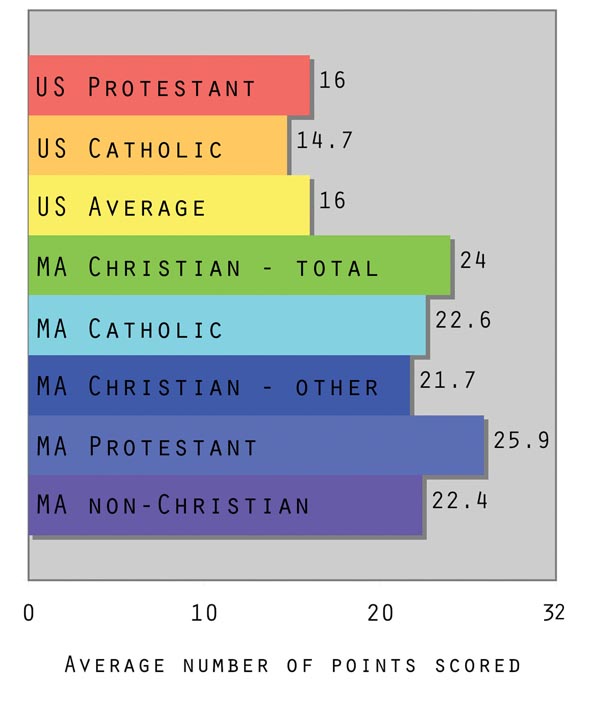MA seniors do well on Pew Forum religion survey
by Wilson Kozel
Talon staff writer
Are you smarter than an MA senior? It seems that the average American is not, at least when it comes to general religious knowledge. This is based on a survey done by the Talon using questions, with permission, from the Pew Forum on Religion and Public Life.
Poll procedure
The Talon survey used the same 32 questions as the Pew Forum that tested American’s general religious knowledge (based on religious affiliation). The 32 questions cover various questions regarding most of the worlds major religions.
The survey was “a nationwide poll conducted from May 19 through June 6, 2010, among 3,412 Americans age 18 and older, on landlines and cell phones, in English and Spanish,” said the Pew Forum executive summary.
Students surveyed were Minnehaha seniors (40 boys, 41 girls) who took the survey in English or AP English via the Talon website, redhawksonline.com. Students were surveyed March 16-18, 2011.
MA results
Results were very favorable for Minnehaha students as they scored nearly 25 percent better than the national average, improving on the national average by roughly eight out of 32 questions (National average: 16, MA average: 23.8). This graphic shows the breakdown:
“I’m very pleased and very encouraged,” said Dr. Jeff Crafton, Minnehaha sacred studies teacher.
US residents having received a high school education or less scored much lower than the national average, at around 12.8 questions correct out of 32.
Among the highest Minnehaha scores were three students (two boys and one girl) with a score of 31 out of 32, and three students (three boys) with 30 out of 32. Still, the average correct answers for boys and girls were virtually identical, with less than a one percent difference between average score.
“This is what they would call a skewed population, that is it’s not the average person,” said Crafton. “The people at Minnehaha tend to be people who either have a more religious background or more interest in religious things.”
Highest scoring questions
Roughly 96 percent of students were able to distinguish Zeus as the king of the gods in ancient Greek mythology. About 94 percent of students correctly answered that a public school teacher cannot lead a class in prayer. Also with 94 percent correct answers were identifying the major religion of Pakistan (Islam), naming the first book of the Bible (Genesis), and naming the Gospels (Matthew, Mark, Luke, John). Approximately 93 percent were able to classify atheists as people who do NOT believe in God. Lastly, close to 91 percent of students surveyed were able to correctly choose the biblical birthplace of Jesus (Bethlehem). Also with 91 percent was identifying Joseph Smith as a famous Mormon.
Interesting findings
Only 47 percent of Protestants surveyed at MA could identify one of the major differences between Protestant and Catholic beliefs: that Protestants say salvation comes through faith alone, and Catholics say that good works are part of salvation. Students in the Christian-other category scored considerably higher on this question, with 71 percent of them answering correctly.
While only about 12 percent of MA students surveyed identified as non-Christian, two of the top six scores were submitted by students in this demographic; however, two of the bottom six scores were in this demographic as well.
Also, many students (67.9 percent) think that public schools cannot use the Bible as an example of literature, when in fact that is allowed. The same was true nationwide with 67 percent of Americans surveyed thinking that this was not allowed.
“I think there’s a lot of misunderstanding of what the principle of separation of church and state really means,” said Crafton. “I suppose it’s also a lot of people who have had experience in public schools, where the teachers in order not to get into trouble may just try to avoid the subject altogether.”
Findings by Pew Research Center
Education played a very significant role in scores nationwide with college grads getting nearly eight more questions correct than people with less than or equivalent to a high school education. And yet, MA students scored about three points higher than the average US college graduate.
”Through the history classes, social studies classes and religion classes here students get exposed to other religions,” Crafton said.
The Pew Research Center also concluded that white people generally score better than minorities, Southerners do not score as well as people outside of the South, and older people (65+) score about average on Bible and Christianity questions but don’t do as well on world religion questions as younger people (under 50).
The Pew survey also included nine general knowledge questions. The questions helped reveal that people who did well on the general knowledge questions usually did well on the religious knowledge questions also.
During the Pew survey 70 percent of Americans admitted they seldom or never read books or visit websites about religions other than their own.
Want to try it yourself? Try this shorter version of the quiz from the Pew Forum.
Symbols graphic by Durova/Wikimedia Commons:


